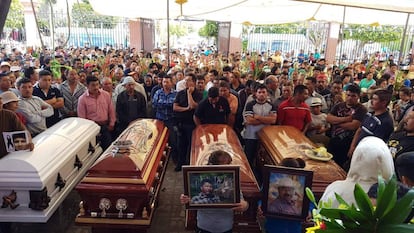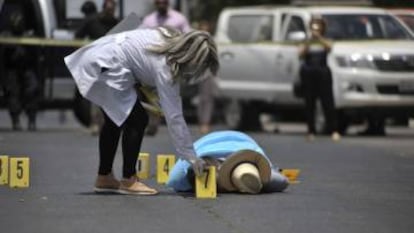Mexico second-most deadly country in the world, says new report
This year set to be most violent yet of President Enrique Peña Nieto’s administration
A shoot-out between the armed forces and gasoline thieves; an attack on government headquarters with five dead; a mother and activist killed in Tamaulipas… This is Mexico’s litany of crime in May, but it could just as easily apply to April and probably June, as violence and impunity spread to the very heart of its society.

For President Enrique Peña Nieto and his administration, 2017 is proving the most violent year yet. January and February saw an alarming uptick in violence while March recorded 2,020 murders. The last time Mexico saw more than 2,000 murders in a month was in 2011, during Felipe Calderón’s presidency, when the army was called on to join the fight against organized crime – a struggle that claimed an estimated 200,000 lives and left more than 30,000 missing.
The violence has been flagged up in a report by the UK-based International Institute for Strategic Studies (IISS). Citing the 23,000 murders in 2016, the think-tank’s Armed Conflict Survey 2017 named Mexico the second-most-violent country in the world, second only to Syria, whose death toll was 73,000, but beating war zones such as Afghanistan and Iraq which saw 17,000 and 16,000 murders respectively.
Some 39% of Mexicans believe drug cartels run the country, according to a survey by pollsters Parametría
The IISS notes an increase of 22.8% in crime over the last year in Mexico, despite Peña Nieto’s campaign promise to tackle the problem. It also observes that Mexico has made no progress with its Internal Security Law, legislation aimed at regulating the armed forces’ involvement in fighting organized crime.
The IISS report has raised hackles in Mexico with government officials refuting the claim that Mexico is the second-deadliest country in the world – a conclusion they say has no solid foundation. In a joint statement, the Foreign and Interior Ministries point out that it was “irresponsible and incorrect” of the IISS to use the term “armed conflict” to describe Mexico’s violence. They go on to cite UN figures that put Brazil and Venezuela’s homicide rates significantly above Mexico’s.
“We have a very serious problem with violence and a lack of accountability,” says security analyst Alejandro Hope. “But this report doesn't make sense.”
The law-enforcement tactic of breaking up the drug cartels is partly responsible for the surge in violence as new bosses jockey for power. The Jalisco Nueva Generación cartel, for example, is flexing its muscles following the extradition to the US of Joaquín ‘El Chapo’ Guzmán, boss of the Sinaloa cartel that is now struggling to maintain its position.
This report doesn’t make sense Alejandro Hope, security analyst
One of El Chapo’s successors, Dámaso López, “The Professor,” was arrested last week in a wealthy neighborhood of Mexico City. Days later some of his colleagues would be murdered in the same area, suggesting the drug gangs were operating at the heart of the capital.
Not that this is news. What is worth a headline, though, is the general perception of the role of the cartels in Mexican society. In an article in the daily Milenio, Francisco Abundis, director of pollsters Parametría, writes that 39% of Mexicans believe the cartels run the country, against 28% who believe it is the president. And when it comes to things being done for the community, 36% believe the cartels do more than the government and 35% believe that organized crime generates jobs.
Undoubtedly, 2017 is being shaped by Mexico’s relationship with the United States. President Trump is intent on drawing attention to the country’s lack of accountability and corruption, and is now focusing on its organized crime record. All three are linked and are steadily eating away at the fabric of Mexico’s society.
Journalists strike against violence

Journalists in Mexico are on strike on Tuesday to protest the violence suffered by media professionals in the country. On Monday, Javier Valdez, a high-profile reporter specializing in covering the drug trade was murdered in Sinaloa state – the sixth journalist to be murdered in Mexico this year.
The murder of Valdez sparked a huge online reaction while media outlets including the online news portal Animal Político said they would strike. The newspapers Reforma and La Jornada, where the work of Valdez was published, printed an open letter criticizing the state of free speech in Mexico. Meanwhile, President Enrique Peña Nieto condemned the murder.
English version by Heather Galloway.
Tu suscripción se está usando en otro dispositivo
¿Quieres añadir otro usuario a tu suscripción?
Si continúas leyendo en este dispositivo, no se podrá leer en el otro.
FlechaTu suscripción se está usando en otro dispositivo y solo puedes acceder a EL PAÍS desde un dispositivo a la vez.
Si quieres compartir tu cuenta, cambia tu suscripción a la modalidad Premium, así podrás añadir otro usuario. Cada uno accederá con su propia cuenta de email, lo que os permitirá personalizar vuestra experiencia en EL PAÍS.
¿Tienes una suscripción de empresa? Accede aquí para contratar más cuentas.
En el caso de no saber quién está usando tu cuenta, te recomendamos cambiar tu contraseña aquí.
Si decides continuar compartiendo tu cuenta, este mensaje se mostrará en tu dispositivo y en el de la otra persona que está usando tu cuenta de forma indefinida, afectando a tu experiencia de lectura. Puedes consultar aquí los términos y condiciones de la suscripción digital.









































